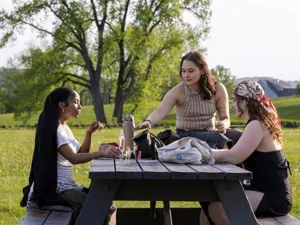
Student Handbook
Bennington’s student handbooks outline the principles, expectations, and resources that guide life at the College, both inside and outside the classroom. They reflect a community built on trust, creativity, and personal responsibility.
Bennington regards education as a sensual and ethical, no less than an intellectual, process. It seeks to liberate and nurture the individuality, the creative intelligence, and the ethical and aesthetic sensibility of its students, to the end that their richly varied natural endowments will be directed toward self-fulfillment and toward constructive social purposes. We believe that these educational goals are best served by demanding of our students active participation in the planning of their own programs, and in the regulation of their own lives on campus. Student freedom is not the absence of restraint, however; it is rather the fullest possible substitution of habits of self-restraint for restraint imposed by others. The exercise of student freedom is the very condition of a meaningful education, and an essential aspect of the nurture of free citizens, dedicated to civilized values and capable of creative and constructive membership in modern society.
—Traditional Bennington College commencement statement
This statement has long framed Bennington’s philosophy: that freedom and responsibility are inseparable. The College’s handbooks and policies are designed to support that balance, both providing the structure and shared understanding that allow students to shape their own paths, participate fully in campus life, and thrive as members of a creative and ethical community.
Student Handbook

Your comprehensive guide to life at Bennington, from community expectations and academic standards to campus resources, safety (including Title IX, Sexual Harassment, and Misconduct), and student support.
Field Work Term Handbook

Everything you need to plan and complete your Field Work Term (FWT), including timelines, eligibility, learning goals, and reporting requirements.
Financial Aid Handbook

Information about maintaining eligibility, understanding aid types, deadlines, and policies that guide the administration of financial aid at Bennington.